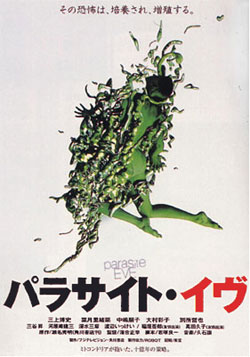 Hideaki Sena’s novel PARASITE EVE, a biological mind-bender, is a seminal text in modern Japanese horror, but presents a prospective filmmaker with innumerable problems. For proof check out this film adaptation, which falls into every conceivable trap, turning a memorable book into a silly and misconceived muddle.
Hideaki Sena’s novel PARASITE EVE, a biological mind-bender, is a seminal text in modern Japanese horror, but presents a prospective filmmaker with innumerable problems. For proof check out this film adaptation, which falls into every conceivable trap, turning a memorable book into a silly and misconceived muddle.
PARASITE EVE (PARASAITO IBU), by pharmacologist-turned-novelist Hideaki Sena, was initially published in Japan back in 1995. It was an immediate sensation, selling millions of copies, winning its author the first-ever Japan Horror Award and inspiring a hugely popular video game. It also spawned this film adaptation, a substandard affair that appeared in 1997.
BTW, the book, after too long a wait, finally appeared in an English translation in late 2005, courtesy of Vertical books. Unlike this film, I highly recommend it.
One morning Kiyomi, the young trophy wife of Dr. Toshiaki Nagashima, goes into some sort of swoon while driving and crashes her car. She dies in the accident, and Toshiaki is overwhelmed with grief. He decides to snatch a portion of his dead wife’s liver so he can cultivate her cells, thus keeping a part of her alive. What he doesn’t know is that Kiyomi was infected with “Mitochondria Eve”, the biological basis for humankind, who after millions of years of servitude to her host organisms has elected to stop doing their bidding and call the shots herself. Thus the liver sample Toshiaki has taken from his beloved begins to display strange biological activity as its cells divide and mutate in unexpected fashion.
At the same time Mariko, a teenage girl with severe health problems, is about to receive one of Kiyomi’s kidneys. This is just what Mitochondria Eve wants, as it will enable her to spread her influence to another body. ME reveals her dastardly plans—to impregnate Mariko through Kiyomi’s kidney and use the birth as a stepping stone toward world domination—by possessing the body of Toshiaki’s pretty young assistant, who’s conveniently delivering a speech to an auditorium full of professors…who, as you might guess, are shocked at what she reveals. From there ME shoots her essence through sewer pipes to Mariko’s hospital room, where ME reforms into a semblance of Kiyomi in order to protect Mariko, the mother to be. ME can do troubling things like set people’s bodies aflame by telepathically connecting with their cells; she’s unstoppable, it seems, until Toshiaki shows up to put an end to her reign. ME, despite her behavior, is in love with Toshiaki, and will do anything to be with him. Hence the finale, in which Toshiaki sacrifices himself to save humankind and ME conflagrates both in the name of true love.
Hideaki’s novel might seem a natural candidate for the movies, packed as it is with gruesome Cronenbergian imagery that would have any special effects technician drooling. The problem is it would be VERY difficult to do the novel justice without turning the material into an unintentional comedy…a trap director Masayuki Ochiai falls into head first, ending up with a nonsensical and ridiculous product. Nor does the film work as camp: it’s far too synthetic, with lighting best suited to a music video and uniformly crummy performances (there’s no point singling any of the actors out—they’re all lousy). As if that weren’t enough, the film also suffers from cartoony CGI effects that woefully fail to convince. If anyone out there wants a primer on how NOT to adapt a novel, this film is it.
Vital Statistics
PARASITE EVE [PARASAITO IVU]
Fuji Television Network/Kadokawa Shoten Publishing Co.
Director: Masayuki Ochiai
Producer: Daisuke Sekiguchi
Screenplay: Ryoichi Kimizuka
(Based on a novel by Hideaki Sena)
Cast: Hiroshi Mikami, Riona Hazuki, Tomoko Nakajima, Ayoko Omura, Goro Inagaki, Hisako Manda, Tetsuya Bessho, Noboru Mitani, Kenzo Kawarazaki
